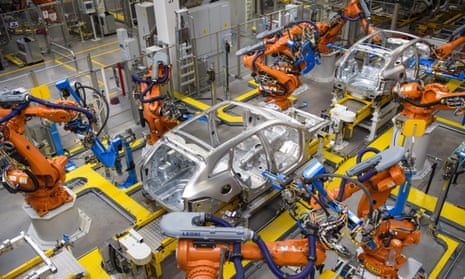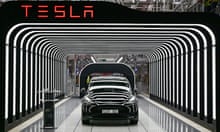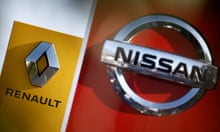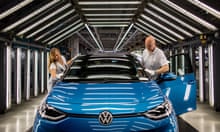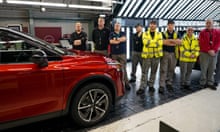The government has offered the owner of Jaguar Land Rover £500m in subsidies in an effort to persuade the carmaker to build a new electric battery plant in the UK.
The chancellor, Jeremy Hunt, has put forward a package of incentives to entice JLR’s parent company, days after three global carmakers warned that Brexit rules on where parts were sourced threatened the future of the British automotive industry.
The Indian conglomerate Tata, the parent company of JLR, is in the process of deciding whether to build the new electric battery production facility in the UK or Spain.
The Treasury package includes a mixture of a cash grant and reductions in energy costs as well as covering the cost of upgrading the power network and transport connections around the site identified in Somerset, a government source said. The Times first reported that the government was willing to meet Tata’s request for £500m, after months of negotiations.
The government has also offered its parent company, Tata, which also owns UK businesses including Tetley Tea, a £300m package to help upgrade and decarbonise its Port Talbot steelworks facility in south Wales.
Last year, Natarajan Chandrasekaran, the chair of Tata, said that if the group could not negotiate significant subsidies from the government to help transition the plant’s blastfurnaces to greener production methods it would “have to look at closures of sites”.
The Port Talbot site employs about 3,500 people and is one of only two plants in Britain capable of turning iron ore and coal into molten iron and steel. Overall, the subsidiary Tata Steel UK employs about 8,000 people.
The £500m offer to JLR’s owner represents a major commitment from the UK government, with the total budget for its automotive transformation fund, which aims to support the British car industry’s shift to electric vehicles, currently only at £1bn.
The UK government tends to support most large automotive factory investments with subsidies worth between 10% and 20% of the cost of the project. Ministers have come under intense political pressure to offer support to a battery factory to supply JLR in particular because it owns more factories in the UK than any other carmaker.
The JLR chief executive, Adrian Mardell, last week said that the company would retain its car factories in the UK even if Tata decides to build the gigafactory in Spain. However, many auto industry analysts are concerned that a failure to produce batteries in the UK will make future investments by carmakers less attractive. The UK only has one gigafactory under construction, Chinese-owned Envision AESC’s site near Nissan’s Sunderland car plant.
Post-Brexit rules require 40% of an electric vehicle’s parts by value to be sourced in the UK or EU if it is to be sold on the other side of the Channel without a 10% trade tariff. This proportion is due to rise to 45% next year, and by 2027 carmakers will need to source the entire battery pack from within the EU or UK to avoid the tariffs when exporting.
after newsletter promotion
Because most electric vehicle batteries are still imported from Asia, and batteries make up a large part of the cost of building a car, some carmakers claim their vehicles made in the UK and the EU are likely to fall foul of the rules.
On Wednesday, Stellantis, which owns the Vauxhall, Peugeot and Citroën brands, said it could be forced to shut some of its UK operations if the Brexit deal was not renegotiated.
Ford, which makes electric cars in Germany and parts in the UK, said the requirement would add “pointless cost to customers wanting to go green”.
JLR called on the UK and EU to “quickly agree a better implementation solution to avoid destabilising the industry’s transition to clean mobility”.
